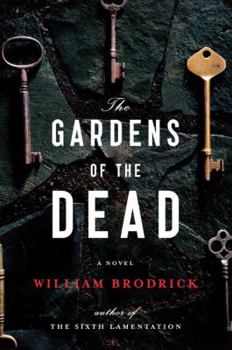Book Overview
In The 6th Lamentation, Brodrick introduced readers to Father Anselm, a barrister-cum-monk-cum-detective. In The Gardens of the Dead, Father Anselm investigates the mysterious and troubling death of... This description may be from another edition of this product.
Format:Hardcover
Language:English
ISBN:0670034983
ISBN13:9780670034987
Release Date:September 2006
Publisher:Viking
Length:336 Pages
Weight:1.15 lbs.
Dimensions:9.3" x 1.0" x 6.3"
Customer Reviews
5 ratings
Complex, gorgeously written
Published by Thriftbooks.com User , 15 years ago
This literary mystery is really an old-fashioned morality tale, modern in its shuttle-weave structure, but universal in its theme of good and evil, forgiveness and hope. The writing is gorgeous, poetic and rich. Yes, the double flashbacks were a bit distracting, but the prose more than made up for it. Reminded me a bit of Iris Murdoch, in theme. I admire Brodrick's reach which, if it occasionally exceeds his grasp, is nonetheless worth the time spent. A great read.
Beautifully written
Published by Thriftbooks.com User , 15 years ago
The Gardens of the Dead is an oddity among murder mysteries: it is more poetry than prose. It's stream-of-conscious style and beautiful descriptive narration are a treat to anyone who really enjoys language. It lacks only economy to qualify as true poetry. Most of you who have read the classical authors in the genre will recognize a similarity to Simenon's more psychological works, the non-Maigrets. Here as there the murderer is known, and it is through the details and the connections that the story surprises and entertains. The characters are well formed and enjoyable. The "culprit" is dealt with sympathetically and even secondary characters are complete and well rounded, with a past, present and future that are believable. A truly beautifully written work, almost wasted on a murder mystery.
praise and blame
Published by Thriftbooks.com User , 16 years ago
There are wonderful characters here and a plot that winds elegantly from long-past to near-past to present to mid-past. There is the tension that builds as we are sure that something awful is going to happen when we aren't quite ready for it, and word-play that slides quiet puns - sole, soul - by us as smoothly as the river slips by Anselm's monastery. But, best of all, there are ideas. "We can't be luke-warm," Elizabeth says on page 8 (UK paper ed.) And that theme winds through the novel, as people are indifferent and passionate and, of course, luke-warm. We hear the phrase again and again in different words from different lips and then, on page 187, when a homeless man quotes Dante - "they lived with no praise and no blame" - we hear it with no sense of surprise, we recognize it without the need for attribution, prepared by the details of the man who speaks only in a vestibule. This is a lovely book. Not a frantic beach read and not a conventional thriller, but all the better for that. Brodrick is subtle but not pretentious as he quietly gives us the lives of these people, so many of them in extremis, all presented without exclamation points or scare-quotes or italics that fill in gaps in an author's vocabulary. Yes, there are a few infelicities, as other reviews point out, but there is much more to please the mind's ear. Elizabeth's will survives her death and impels Anselm and George and her son to move beyond the places in their lives where they have stopped, whether through grace or madness or that dazed inertial of the 20-something over-achiever. The ending is harsh, in some respects, full of shocks to the system and, perhaps, somewhat jumbled. But the complex characters hold up very well as the changes are rung, even if the plot unravels a bit. This is a book of messages, written and spoken. If you have a long, slow summer's day to spend under a shade tree, take this book along and you will be content.
Poetic Tapestry
Published by Thriftbooks.com User , 17 years ago
This story is intricately crafted, and skillfully told. The intellectual and spiritual themes that run through the story transend the typical mystery novel genre. Brodrick's heavy use of metaphor and simile creates poetic prose (I love this; it may not be to everyone's taste). The story unfolds through several different characters--each a strand of different colored thread--so at first it seems impossible that all of the characters and events will come together to provide a cohesive conclusion. At the end, the full tapestry comes into view, and the beauty of the complete work becomes apparent. Days after having finished the book, I still find myself reflecting back on it.
A Gentler, Smarter, John Grisham
Published by Thriftbooks.com User , 17 years ago
I really enjoyed this book. I esp. like that Broderick is able to look at the nature of guilt and forgiveness from a spiritual, not just a legal, point of view.




